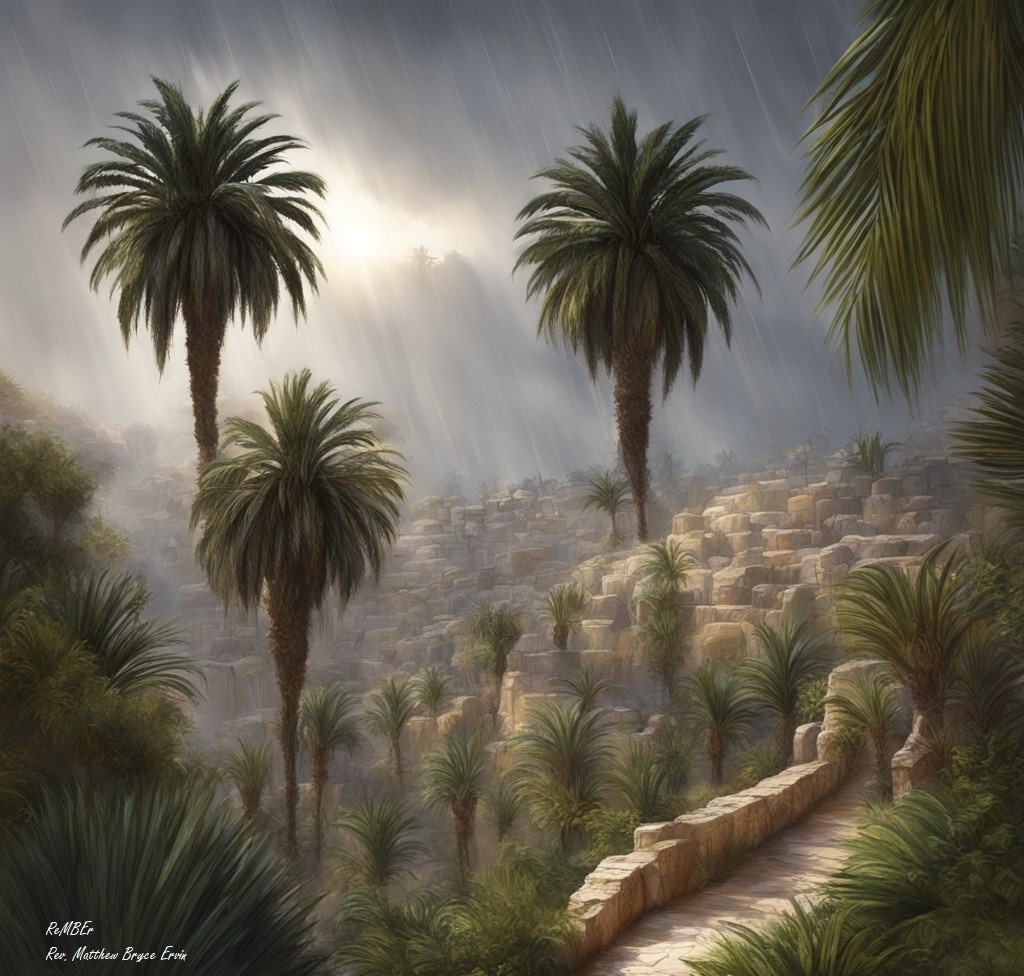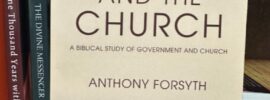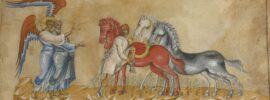
Months in the Bible are almost always referred to by their ordinal numbers: the first month, the second month, and so on. A notable exception to that rule is the eighth month, which is also called Bul in 1 Kings 6:38. Bul (בּוּל) derives from the same root as mabbul (מַבּוּל), the name for Noah’s flood (e.g., Gen 7:6). Flavius Josephus, the famed Jewish historian, even taught that the flood started in the eighth month.[1] This would seem to contradict Genesis 7:11, where it is stated that the flood came “in the second month, on the seventeenth day of the month” (NASB 1995). But according to Josephus, this was a different ordering based on how the Hebrews arranged their calendar in Egypt.[2] Regardless of whether or not Josephus was correct, Bul is a month of rain and moisture.
The Jerusalem Talmud tells us that when the Jews returned from exile in Babylon, they brought Babylonian names for the months along with them.[3] According to ancient sources such as the Babylonian Talmud[4] and Josephus,[5] the eighth month was named Marcheshvan (later called by the shortened Cheshvan). The meaning of Marcheshvan is unclear. It is possible that the name derives from Akkadian (Babylonian and Assyrian). The “w” and “m” sounds are interchangeable in Akkadian. So perhaps Marcheshvan broken down into the words merach (“month”) and shwan (“eight”) could be rendered as warh and shman, which corresponds to the Hebrew yerach shemini, the “eighth month.” This isn’t an especially strong answer though; it both makes assumptions and isn’t in harmony with the meaning of the name Bul.
There is also a tradition that Marcheshvan means the “bitter month,” either since no feast days or holidays occur in it or because the matriarch Sarah died in this month.[6] In this view, mar (מַר), which typically means “bitter” in Hebrew, is taken to be an appellation added to describe the month. By itself, Cheshvan, would then, be best understood as a Hebraic construction based on a word that was used in Babylon for “month.” However, there is nothing in early Jewish literature that strongly connects Marcheshvan to bitterness. In contrast, as we saw with Josephus, there is a solid connection in early Jewish literature between the rainy eighth month and Marcheshvan.
I favor the view that when it comes to Marcheshvan , mar actually means “drop,” as it does in Isaiah 40:15.[7] Thus, Marcheshvan is the “month of a droplet,” signifying the first rains. This is the most simple and straightforward way to understand the name. And this view is in harmony with the meaning of the month’s older name, Bul. Regardless, the eighth month (October-November) coincides with the beginning of the rainy season in the Holy Land. Even so, rain was not guaranteed. The people especially prayed for rain during the eighth month. It is taught in the Mishnah that the people should ask for rain on the third or on the seventh of Marcheshvan.[8] And on the seventh of Marcheshvan in Israel today, prayers for rain are added to the Amida, the “standing” prayer.
Since the post-exilic names for the months originally came from Babylon, they do little to help us understand the Bible. Marcheshvan is arguably the sole exception. That’s because once we are mindful of the fact that the eighth month is the ideal time for rain, it can help us to better understand some passages that mention the month. Perhaps the best example comes from Zechariah 1:1. The date given to us at the beginning of the Book of Zechariah creates a bookend of sorts with the prophecy at the end of the book in 14:16–19, where during the Messianic Kingdom the nations of the earth will be required to make pilgrimages to Jerusalem to keep the Feast of Tabernacles and to worship the King, Yahweh of armies. Rain will be withheld from any nation that fails to make the pilgrimage. This idea of bookending conforms well with the pattern we see in Zechariah, where the beginning of the book anticipates the end, matching it in several respects. We also find in Zechariah 1:1, that the prophet dated his book to Darius I, which is a stark reminder that the people were under the power of Persia and that they weren’t allowed a king of their own. But in the end of Zechariah, we see that it is the divine, messianic King who will rule over all the nations of earth (14:9). On a broader note, at the opening of the book, the Lord told the people of Israel to return to Him so that He may return to them (1:3). And at the close of the book, it is the other nations of the earth who will have to turn to the Lord and travel to Jerusalem to worship the Messiah (14:16–19; cf. 8:20–23). On a final point of conformity—though much more could be said—the purpose of Zechariah’s eight night visions was to encourage the people to rebuild the temple (1:7—6:8). This would ultimately lead to the coming of the “Branch,” the Messiah who would build yet another temple when He returns (6:12–13). The overarching theme of Zechariah, is then, that the prophet stood with one foot in his present time while the other stood in the glorious future that awaits Israel. The date we first read at the opening of his book is part of that theme, one that is often overlooked.
Rain is a cardinal example of something that the Lord provides people with as a blessing (e.g., Lev 26:4; Deut 28:12; 1 Kgs 8:35; 18:1; Joel 2:23; Zech 10:1; Acts 14:17; Jas 5:18) or what he withholds as a curse (e.g., Deut 28:24; 1 Kgs 8:35; 17:1; 2 Chr 7:13; Jas 5:17; Rev 11:6). Jesus spoke of rain as one of God’s universal blessings, both on the just and the unjust (Matt 5:45). The Lord’s message first coming to Zechariah during the autumnal, rainy month suggests that it was given in anticipation of the Messianic Age—when the Lord Jesus will reign from Jerusalem!
[1] Josephus, Jewish Antiquities 1.80.
[2] Josephus, Jewish Antiquities 1.80–81.
[3] y. Rosh Hashanah 1:2.
[4] E.g., b. Rosh Hashanah 7a.
[5] Josephus, Jewish Antiquities 1.80.
[6] Esther Rabbah 7:11 states that Sarah died in Marcheshvan. However, Jewish views on the date of Sarah’s death differ, with many through the centuries teaching that she died in Nissan, soon after the Akedah, the “binding” of Isaac.
[7] Even though it is just one word, mar has two distinct entries in the lexicons: Strong’s number 4751 for the meaning “bitter,” and number 4752 for “a drop.” The underlying meaning is related to distillation, which speaks to something that is bitter or to something that is a distilled liquid—like rainwater.
[8] m. Ta’anit 1:3. The discrepancy comes from Rabban Gamliel, who taught that the people should wait until the seventh to give the last Jewish pilgrim returning from observing the Feast of Tabernacles a few more dry days to reach the Euphrates River.










Recent Comments